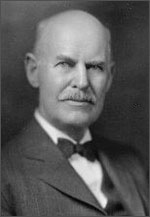ECS President | 1908-1909
 Edward Goodrich Acheson, a charter member and President of the Society (1908-1909), was born in Washington, PA, on March 9, 1856. From the age of 30 to 70, he received 69 patents on devices, techniques, and compositions of matter in the fields of mechanics, electricity, electrochemistry, and colloid chemistry.
Edward Goodrich Acheson, a charter member and President of the Society (1908-1909), was born in Washington, PA, on March 9, 1856. From the age of 30 to 70, he received 69 patents on devices, techniques, and compositions of matter in the fields of mechanics, electricity, electrochemistry, and colloid chemistry.
His father’s death required Acheson to start work at the age of 16 to help support his family. He held various railroad jobs, performing scientific work and experiments after hours. Acheson tried selling a battery of his own invention to Thomas Edison who then hired him in 1880 to work at his Menlo Park laboratory under John Kruesi (father of Paul Kruesi, ECS President from1928-1929). Acheson experimented on making a conducting carbon for use in Edison’s electric light bulbs. Recognizing his inventive genius, Edison advanced Acheson quickly. As assistant chief engineer, Acheson spent two-and-a-half years building generating plants and lamp factories in Europe.
In 1884, Acheson returned from Europe and began working as an independent inventor. He developed many new and useful things, however none were to make his fortune until he discovered silicon carbide. The compound, which he called Carborundum, was found to be a better abrasive than any other known substance except diamond. In 1895, a plant was built in Niagara Falls, and Carborundum was soon competitive with other abrasives.
Acheson continued to experiment and developed a process to make artificial graphite. The Acheson Graphite Co. was formed in 1899. In 1928, the company merged with National Carbon Co. Acheson also developed colloidal graphite products. Commercial forms called Oildag and Aquadag were manufactured by the Acheson Colloids Co.
Acheson received many honors and awards including the Perkin Medal and an honorary Doctor of Science degree. In 1928, he provided funds to establish what is known as the Edward Goodrich Acheson Award. In 1929, he was himself the first recipient. The Acheson family has provided funds to maintain the award. One of the highest honors ECS bestows, it recognizes distinguished contributions to the advancement of any of the Society’s objects, purposes or activities.

